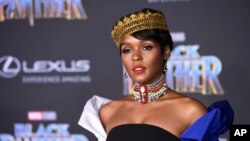When Jennifer Emejulu went to see “Black Panther,” the New Jersey resident didn’t feel like wearing any of the traditional Nigerian clothing she routinely wears for family parties.
She enjoyed seeing photos of those who did come out to see the global blockbuster about the superhero leader of a fictional African nation dressed in their African-inspired outfits, but Emejulu found it a little ironic, too.
“Growing up, we used to get made fun of for being African” by black Americans, says the 36-year-old physical therapist who was born and raised in the United States to Nigerian immigrant parents. “Now ... we’re in, we’re cool.”
In the weeks since its release, “Black Panther” has been a juggernaut — holding the top box-office spot, bringing in more than $560 million domestically and $1 billion globally. Featuring a predominantly black cast hailing from the all over the world, it’s an American-made film from an African-American director, Ryan Coogler, that’s an ode to Africa — set in the fictional, never-colonized and immeasurably powerful nation of Wakanda, with costuming and sets heavily inspired by existing African cultures.
Its central story pits T’Challa, the Black Panther and king of Wakanda, against Erik Killmonger, the son of T’Challa’s uncle and an American woman, who was abandoned in America, and touches on how and whether the country’s power should be used in aid of black people globally. Killmonger, played by Michael B. Jordan, feels his father’s African homeland should arm black people in global uprisings, while T’Challa, played by Chadwick Boseman, questions his country’s history of isolationism but doesn’t want to see global bloodshed or Wakandan imperialism.
In touching on the questions of what’s the connection or displacement among peoples of African descent all over the world, it’s put a spotlight on a very real-world issue, one that’s been talked about by academics and activists for a century and more and one that’s had an impact on how Africans and African-Americans have interacted with each other.
African-American figures including W.E.B. Du Bois and Malcolm X have long invoked a connection between American blacks, descended from those who were forced to come here as slaves and stripped of everything including their cultural heritages, with Africans on the continent and Africa itself, said Jonathan Gray, associate professor at John Jay College in Manhattan.
“For a lot of people who are ‘conscious,’ there is this tradition where we’ve tried to discern this connection,” he said. “It’s an act of diasporic imagination. It’s the same act of imagination that allows for a Jew living in Portugal, a Jew living in Brazil and a Jew living in Poland to all think of Jerusalem as their home even though, let’s say in 1930, none of them had ever been to Jerusalem.”
Some of the context of the need and desire for that connection has been the legalized racism of the systems African-Americans were forced to live under, first slavery and then segregation, for much of the history of the United States, that has made it extremely difficult for most African-Americans to trace their particular ancestries back past a handful of generations in this country.
“If we had been allowed to come here of our own volition and we were able to maintain a sense of identity with where we actually come from with a sense of specificity, there might not be the reaction that people have right now,” said Tony Armstrong, 46, an IT consultant in Miami who has done genetic testing to find even a general sense of where his roots in Africa might be.
“We need to know that we don’t come from nothing,” said Shara Taylor, 34, of Nashville, Tennessee. “We need to know that we came from somewhere, that we didn’t just spring from the ground in chains in the United States.”
But as much as there’s been a push for connection in some corners, there’s been plenty of disconnect as well, and even disdain from one group to the other, as stereotypes like those about poverty-stricken Africa or dangerous inner-city America have been absorbed by both groups, and there’s a lack of real knowledge of the harsh realities of slavery on one hand and colonialism on the other, experts said.
“We meet and encounter each other through these lenses of mutual ignorance,” said Mwatabu Okantah, assistant professor at Kent State University in Kent, Ohio. “It makes relating to each other difficult.”
Writing for the Huffington Post, Jolie A. Doggett questioned whether black Americans would be welcome if Wakanda were a real place. She was doubtful.
“I found myself having to face the sometimes harsh reality that there is a division within our diaspora that’s not going to easily heal,” she said.
Funmilola Fagbamila, adjunct professor at California State University, Los Angeles, said, “There are complexities within black identity, between African-Americans and ... specifically black people in Africa where they would say, no, you are not us.”
But that has been shifting over time, especially in recent years, and the movie could play a role in opening dialogues, said Melina Abdullah, also a professor at Cal State LA, and chairwoman of Pan-African Studies.
“I think the movie is sparking a conversation and consciousness among people,” she said. “The role of black art has always been to kind of awaken us, to get us to think creatively, critically, use our imagination to think about what freedom means.”




